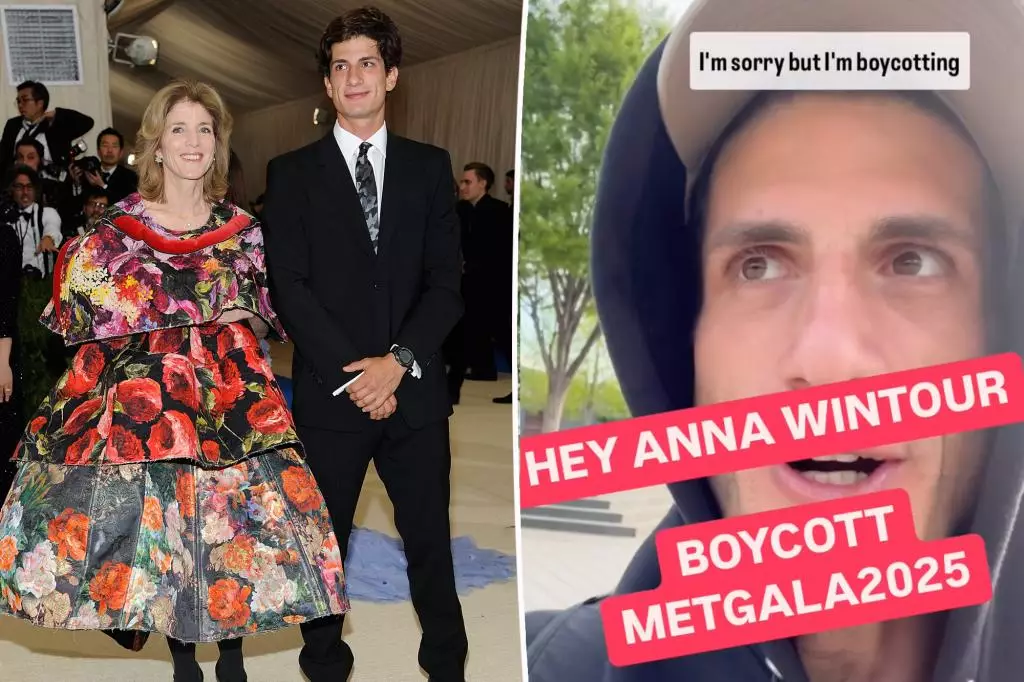Jack Schlossberg, the son of Caroline Kennedy and the grandson of former President John F. Kennedy, has recently stirred conversations on social media with his unconventional stance regarding the upcoming Met Gala. While the event is widely celebrated as the “Oscars of Fashion,” Schlossberg’s claim to boycott it is not grounded in being personally slighted, as sources reveal he was never even on the guest list. This raises intriguing questions about privilege, representation, and the intersections of social mediahood and elite events that dominate public consciousness.
Schlossberg’s efforts to project his discontent stem from a perceived disconnect between fashion and the pressing socio-political issues of today. In a series of posts, Schlossberg passionately declared, “I am boycotting the Met Gala this year. With so much happening at home and around the world, it’s not the time for a party like that—at least for me.” This sentiment, echoed in multiple posts, speaks to a growing louder narrative that critiques the glitz and glamour of elite gatherings amidst ongoing global crises. But his claims appear less about a moral stand grounded in personal principles, and more about raising his profile on a platform where 21st-century grievances are often voiced.
The True Nature of Invitations and Access
The dynamics of being invited to the Met Gala are fascinating and exclusive, reserved primarily for those who either hold significant influence or have specific endorsements from brands and designers. Indeed, another source elaborated on this secretive process: “The Met Gala is a fundraiser where every single seat is paid for by a designer or a brand.” Castle in the air, Schlossberg’s attendance in the past stemmed from his mother, not from his own power or influence. If we assume that true artistry and influence can bring noticeable attention to cause-oriented dialogues, his absence—or rather his self-imposed boycott—might echo louder than the critical volume he aims to generate.
By highlighting his disconnect with the fashion elite, Schlossberg unintentionally underscores a broader issue: the exclusivity and gatekeeping prevalent within this world. This aligns with growing movements advocating for diversity, equity, and inclusion in spaces that have historically marginalized voices of relevance — voices like his, who, despite noble heritage, must continually assert their place within recognized realms.
The Provocative Use of Social Media
In his flurry of posts regarding the gala, Schlossberg has not shied away from repurposing his public dissatisfaction into promotional opportunities for his personal projects. A self-described content creator, he stated, “Instead I will produce something informative on my own news channel,” revealing a dual motivation behind his bold proclamations. Through this lens, his activism appears not just to be a personal crusade but a strategic maneuver to carve out a digital space within a saturated media landscape.
His repudiation of Vogue’s silence on pressing issues in fashion asks a pivotal question: can fashion truly serve as a catalyst for change? “Fashion is political—so then why is Vogue so quiet?!” Schlossberg asked, reflecting a sentiment that resonates deeply with an audience craving accountability from power players in the industry. As he’s using his voice on outmoded concepts of exclusivity, he forces both fashion insiders and outsiders to reckon with the power dynamics at play in pop culture.
The Event’s Theme: A Profound Opportunity?
This year’s Met Gala, themed “Superfine: Tailoring Black Style,” aims to promote and celebrate Black culture within the fashion arena. Schlossberg’s boycott comes at a time when the fashion world is actively engaging with narratives around racial representation and equity. However, his choice to disengage could be viewed as an opportunity lost; rather than elevating his voice through participation, he opts for exclusion. Yet one must consider—can impactful dialogues emerge from a distance, or do they require the connective tissue of presence and participation?
Schlossberg, with a storied name, could have potentially leveraged his platform to advocate for changes within a fashion framework that historically turns a blind eye to critical social issues. By redirecting his energies into social media outbursts, he risks being perceived as more of a provocateur than a serious player interested in meaningful change. In an age dictated by both influence and access, his challenge will ultimately be measured in both how he is positioned within these elite circles and the efficacy of his vocal advocacy.
A complex interplay of privilege, social media, and fashion’s heart presents a stage upon which Schlossberg’s narrative unfolds, revealing the fragility of influence and the weight of generational legacy.

